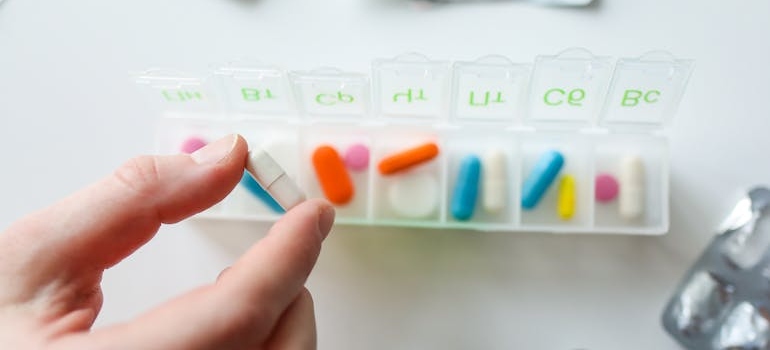Postpartum depression and addiction intersect more often than many realize, bringing complex challenges to new mothers. If you’re feeling overwhelmed by emotions and turning to substances for relief, you’re not alone. This dual struggle is significant, yet frequently misunderstood. We’ll explore what this means for those affected, shedding light on symptoms, why this combination can happen, and effective ways to seek help. With a focus on accessible treatments, including rehabs in WV, we aim to offer you the understanding and resources needed for recovery. No mother should navigate this alone—help is within reach, and recovery is possible.
Defining Postpartum Depression (PPD)
Postpartum depression (PPD) is more than just feeling blue after having a baby. It’s a serious condition that can deeply affect new mothers, sometimes starting during pregnancy and other times appearing up to a year after birth. Unlike the common “baby blues,” which resolve within a few weeks, PPD lasts longer and is far more intense. Symptoms include severe mood swings, persistent sadness, overwhelming fatigue, and a disinterest in life activities you once enjoyed. You might also feel disconnected from your baby, struggle with feelings of worthlessness, or experience intense irritability or anxiety.

Understanding that this is a real and treatable condition is crucial. If these feelings sound familiar, reaching out for help is a strong step toward recovery. With the right support, such as therapy and sometimes medication, you can manage these feelings and enjoy your time with your new baby.
Understanding Addiction
Addiction is a complex condition that can trap anyone. It involves the compulsive use of substances or engagement in behaviors despite harmful consequences. Common addictions include alcohol, nicotine, prescription medications, and illicit drugs like heroin or cocaine. But addiction isn’t limited to substances; behaviors like gambling, eating, or shopping can also become addictive when they disrupt daily life.
The essence of addiction lies in the brain’s reward system, mistakenly prioritizing these substances or behaviors over healthier activities. Breaking this cycle is challenging but crucial for recovery. If you find yourself or someone you care about caught in the grip of addiction, seeking help is a vital first step. With a range of treatments and support, drug rehab centers in WV are equipped to help individuals regain control and embark on the path to recovery. Don’t hesitate to reach out for the help you deserve.
How Addiction Can Worsen Postpartum Depression
Substance abuse can significantly worsen postpartum depression, creating a complex cycle that’s tough to break. When postpartum depression and addiction intersect, the effects on mental health are amplified. Substances like alcohol or drugs might seem like temporary escapes from the weight of depression, but they can actually deepen the symptoms over time. These substances can disrupt sleep, which is already a challenge for new mothers, and can alter brain chemistry, increasing feelings of sadness, anxiety, and isolation.
Moreover, addiction can hamper your ability to seek and receive effective treatment for postpartum depression. It might lead to missed appointments, lack of engagement in therapy, and difficulties in maintaining a support network. Recognizing the impact of substance use is a crucial step towards recovery, encouraging a focus on treatment strategies that address both challenges holistically.

How Postpartum Depression Can Lead to Increased Substance Use
Postpartum depression (PPD) can be incredibly isolating and overwhelming, pushing some to turn to substances as a coping mechanism. The emotional rollercoaster after childbirth, coupled with sleep deprivation and the immense responsibility of caring for a new baby, can make mothers vulnerable. As they grapple with feelings of sadness, anxiety, or disconnection from their child, the temptation to use alcohol or drugs for temporary relief can seem appealing.
This is how postpartum depression and addiction intersect: substances may provide a momentary escape from the relentless pressure and mental strain of PPD, but ultimately, they complicate recovery. This cycle can deepen depression, create dependency, and disrupt the ability to effectively bond with the baby, further increasing feelings of guilt and inadequacy. Understanding this risk is vital for seeking healthier ways to manage the challenges of postpartum depression.
Common Substances Used to Self-Medicate
When struggling with postpartum depression (PPD), some individuals may turn to substances as a form of self-medication. This can often complicate recovery and impact overall health. Here are common substances used and their potential effects:
- Alcohol: Can temporarily numb feelings but ultimately exacerbates depression and anxiety.
- Prescription painkillers: Might bring relief but can lead to dependence and worsen emotional instability.
- Benzodiazepines: Used for anxiety relief, they pose a high risk for addiction and can cause withdrawal symptoms.
- Illicit drugs like cocaine or amphetamines: Provide a temporary escape or energy boost, but significantly disrupt mental and physical health.
The effects of drug abuse on fertility are profound, affecting both current well-being and future family planning. If you or someone you know is using these substances to cope, it’s crucial to seek professional help. Addressing both the addiction and depression is key to recovery, offering a clearer path to a healthier life.
Identifying Risk Factors for Co-occurring PPD and Addiction
Understanding the risk factors that can lead to both postpartum depression and addiction is crucial for prevention and early intervention. Recognizing these factors is a step toward addressing how postpartum depression and addiction intersect, fostering a proactive approach to seeking help and managing these challenges effectively. Here are some key elements that might increase the likelihood of experiencing these co-occurring issues:
- Previous mental health disorders: A history of depression, anxiety, or other mental health conditions can predispose one to postpartum depression.
- Substance use history: Prior or current use of substances can escalate into addiction, especially if used as a coping mechanism for emotional distress.
- Family history: Genetic predispositions to both mental health disorders and substance abuse can play a significant role.
- Lack of support: Insufficient emotional or practical support can intensify feelings of isolation and helplessness, leading to both conditions.

Treatment and Management Strategies
There are many paths to recovery, and seeking help is a brave first step that you should never fear. In this discussion, we’ll explore a variety of options, including substance abuse treatment WV, to support you through this process. Each method offers unique benefits, and we’re here to guide you through understanding how to access the help you need effectively and compassionately. Don’t hesitate to reach out – assistance is closer than you think.
Medication Management
When postpartum depression and addiction intersect, managing medication safely becomes critical. It’s important to work closely with a healthcare provider who understands both conditions. Medication assisted treatment West Virginia has to offer, for instance, is carefully tailored to ensure that the medications used do not exacerbate addiction issues.
The risks of using certain antidepressants or anti-anxiety medications can include dependency or interference with addiction recovery processes. Therefore, alternatives such as non-addictive medication options or therapies that do not involve drugs should be considered. Techniques like cognitive behavioral therapy (CBT) or mindfulness practices can also be effective in managing symptoms without the use of additional medications.

Always ensure any medication plan is reviewed by professionals skilled in treating both postpartum depression and addiction. They can provide a balanced approach that prioritizes your safety and overall health, helping you navigate this complex dual challenge with informed care.
Therapeutic Options
When tackling both postpartum depression and addiction, various therapeutic options can offer significant help. Individual therapy for addiction and depression provides a private space where you can explore your feelings, challenges, and triggers with a professional. It’s tailored to your unique experiences, helping you develop coping strategies that address both conditions.
Group therapy introduces a community element, allowing you to share experiences and gain support from others facing similar struggles. This can be especially empowering, knowing you are not alone in your journey. Family counseling is also invaluable, as it involves loved ones in the healing process. It educates family members about your challenges and teaches them how to provide support effectively. Together, these therapy options create a comprehensive approach to treatment, ensuring you have the necessary support from multiple angles.
Support Systems
Building a strong support network is essential, especially if you’re navigating the challenges of postpartum depression and addiction. Surrounding yourself with people who understand and support your journey can significantly impact your recovery and emotional well-being. Consider joining support groups tailored for new mothers or those specifically designed to help someone with drug addiction and depression. These groups provide a safe space to share experiences, gain insights, and find encouragement from others facing similar challenges.
Additionally, maintaining close connections with friends and family who are empathetic to your situation can offer the emotional sustenance needed during tough times. These relationships can provide practical help, like babysitting or running errands, as well as emotional support, reminding you that you’re not alone in this. Every step of support brings you closer to recovery and helps maintain your strength on tougher days.

Self-Care Strategies
Managing symptoms of postpartum depression and addiction starts with commitment to self-care. Establish a daily routine to provide structure and predictability, which can be immensely grounding. Prioritize sleep whenever possible, as it helps stabilize your mood and enhances overall health. Engage in regular physical activity; even brief walks with your baby can elevate endorphins and diminish stress.
Ensure your diet is well-balanced to positively influence your energy and emotional state throughout the day. Explore mindfulness practices like meditation or yoga to center your thoughts and reduce impulses to use substances as a coping mechanism. Connecting with others is also crucial —reach out to supportive friends, family, or groups who can relate to your journey. Every step toward these helpful tips for moms in recovery fosters resilience and promotes a healthier lifestyle and mindset.
Accessing Resources
If you’re facing both postpartum depression and addiction, know that numerous resources are available to support you. Each of these options is a steppingstone to better health, offering tailored support to help you navigate this challenging time. Don’t hesitate to reach out; help is closer than you think. Here’s a list to help you start your journey toward recovery:
- Local support groups: Many communities offer groups specifically for new mothers or those dealing with addiction. For example, Postpartum Support International provides connections to local groups.
- Hotlines: National helplines like the SAMHSA National Helpline (1-800-662-HELP) offer free, confidential advice 24/7.
- Professional services: Consult healthcare providers or therapists who specialize in maternal mental health and addiction. They can offer personalized treatment plans.
- Online resources: Websites like PostpartumMen and Mothers for Recovery provide valuable information and forums for sharing experiences and advice.
When to Seek Professional Help
Recognizing when to seek professional help is crucial for your well-being, especially if you’re dealing with intense feelings that don’t seem to improve. Here are some signs that it might be time to reach out:
- Constant sadness or feelings of emptiness
- Loss of interest in activities you once enjoyed
- Changes in appetite or sleep patterns
- Feeling unusually irritable or anxious
- Difficulty bonding with your baby
- Thoughts of harming yourself or your baby

If any of these resonate with you, don’t hesitate to seek support. Professionals are ready to help you navigate these challenges, offering the tools and understanding you need to regain your balance and enjoy life again. You’re not alone, and taking this step is a proactive move toward recovery.
Steps to Recovery: What You Can Do Next
Navigating the realities when postpartum depression and addiction intersect can feel impossible, but you’re not alone in this journey. Recognizing the signs is the first step towards finding the support you need. Many have walked this path before you and found strength and healing through accessible resources. Whether it’s reaching out to a healthcare provider, connecting with support groups, or considering rehab options, each step you take is a move towards recovery. Seeking help is a sign of strength, not weakness. You deserve care, support, and understanding as you work towards a healthier future for both you and your family.



